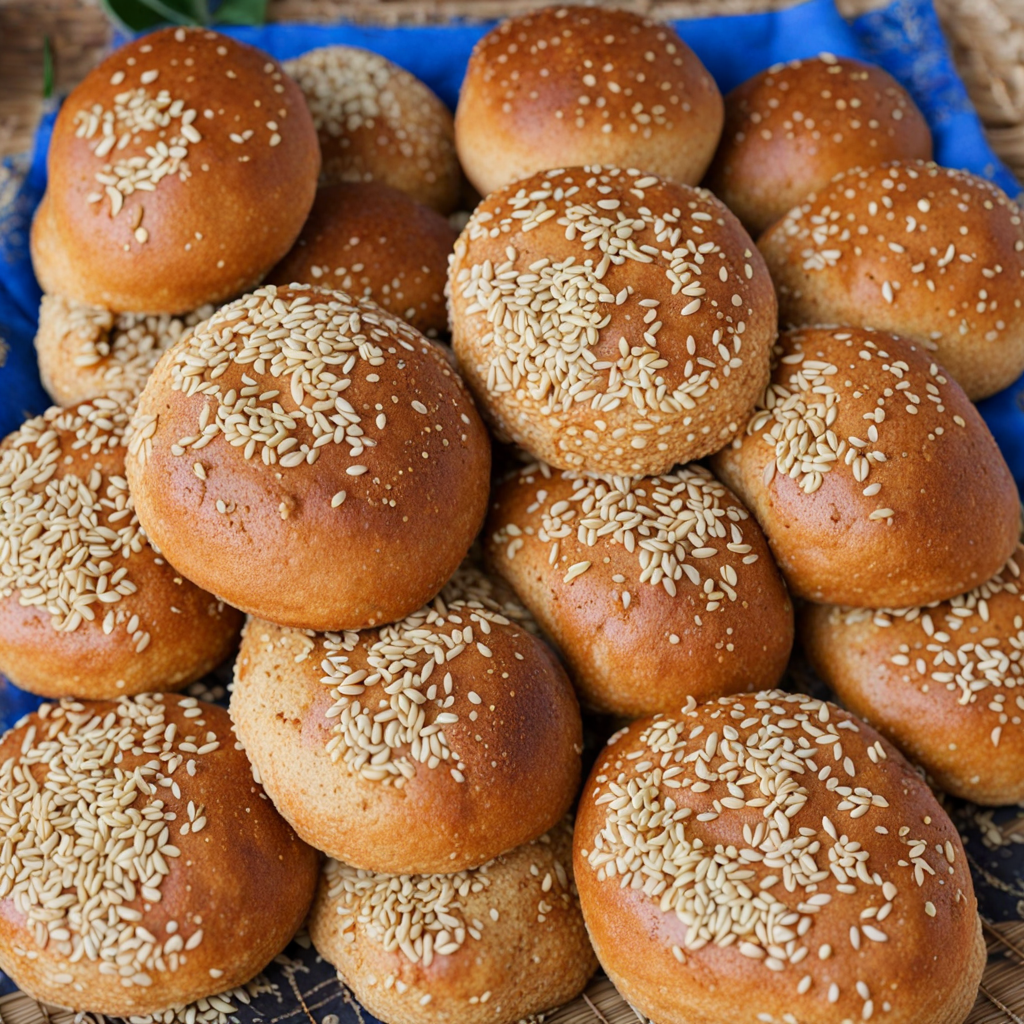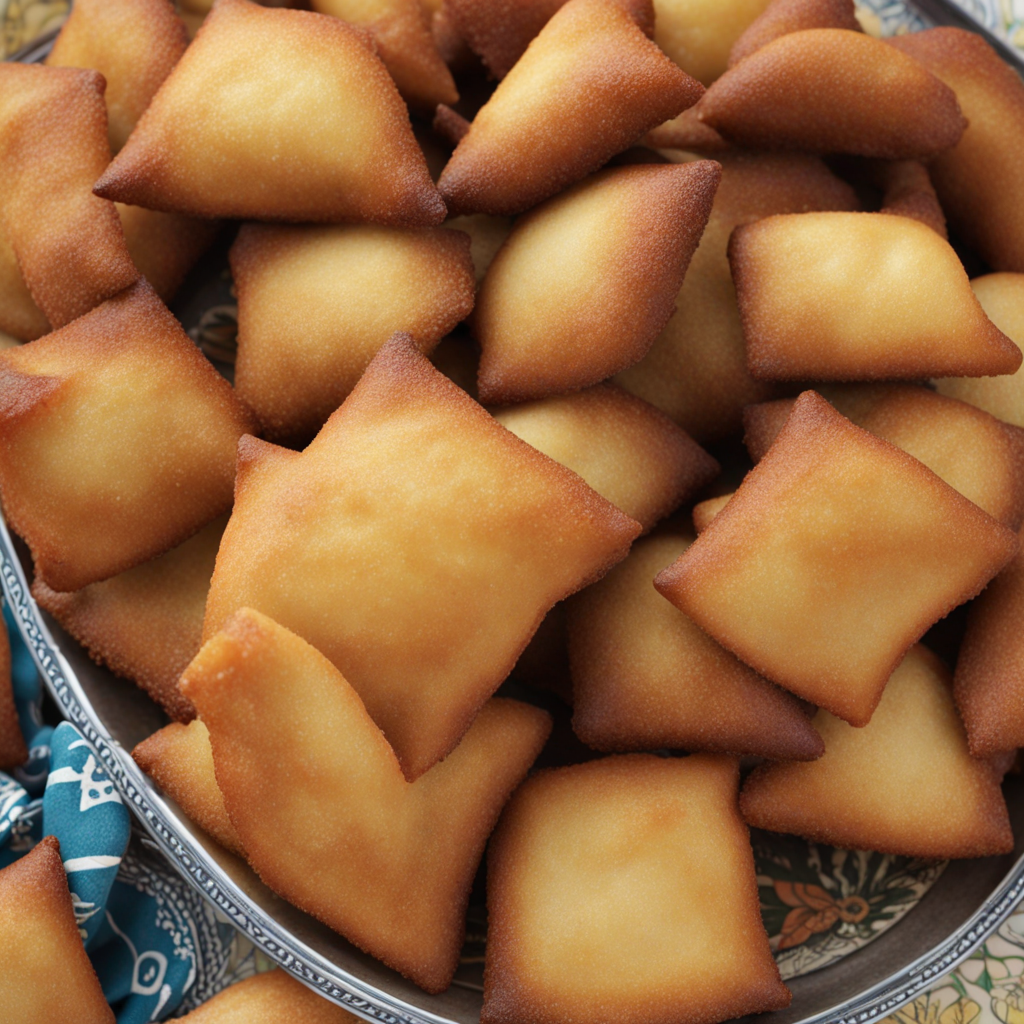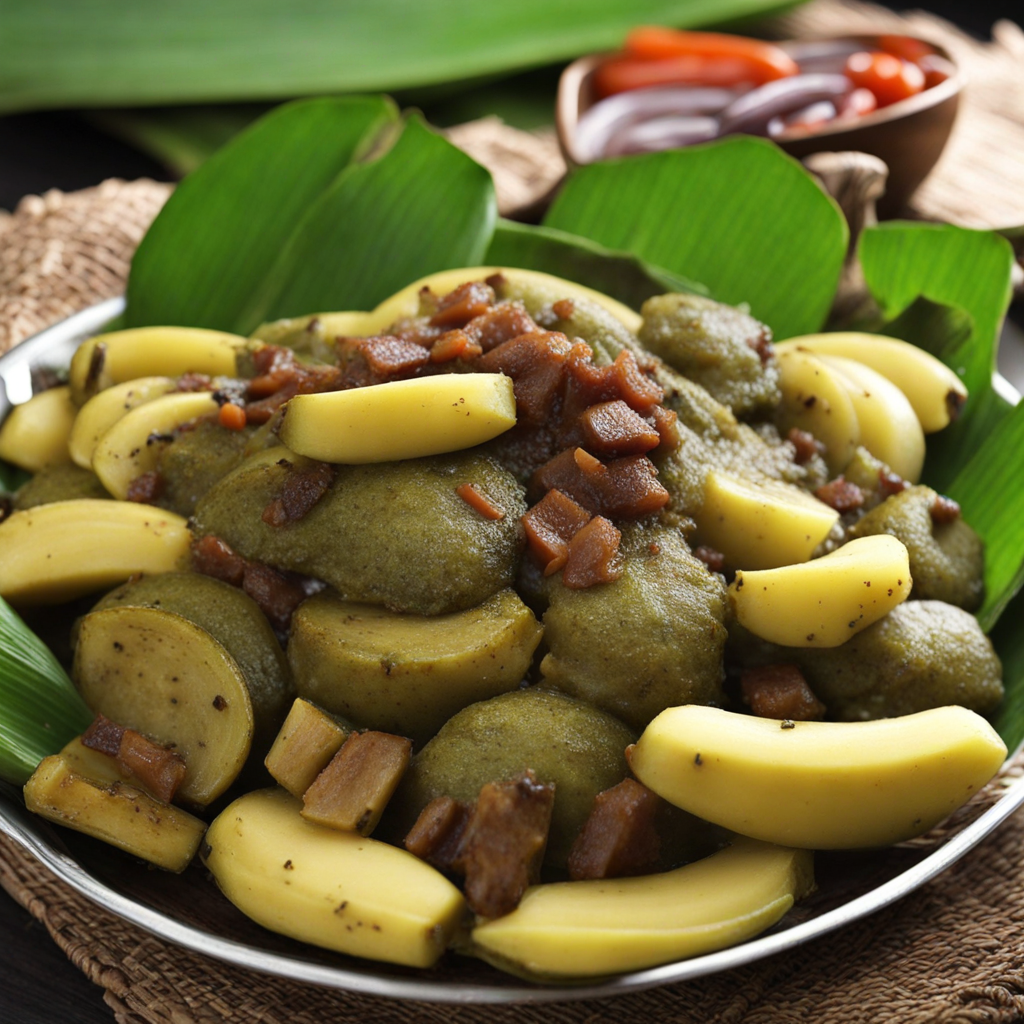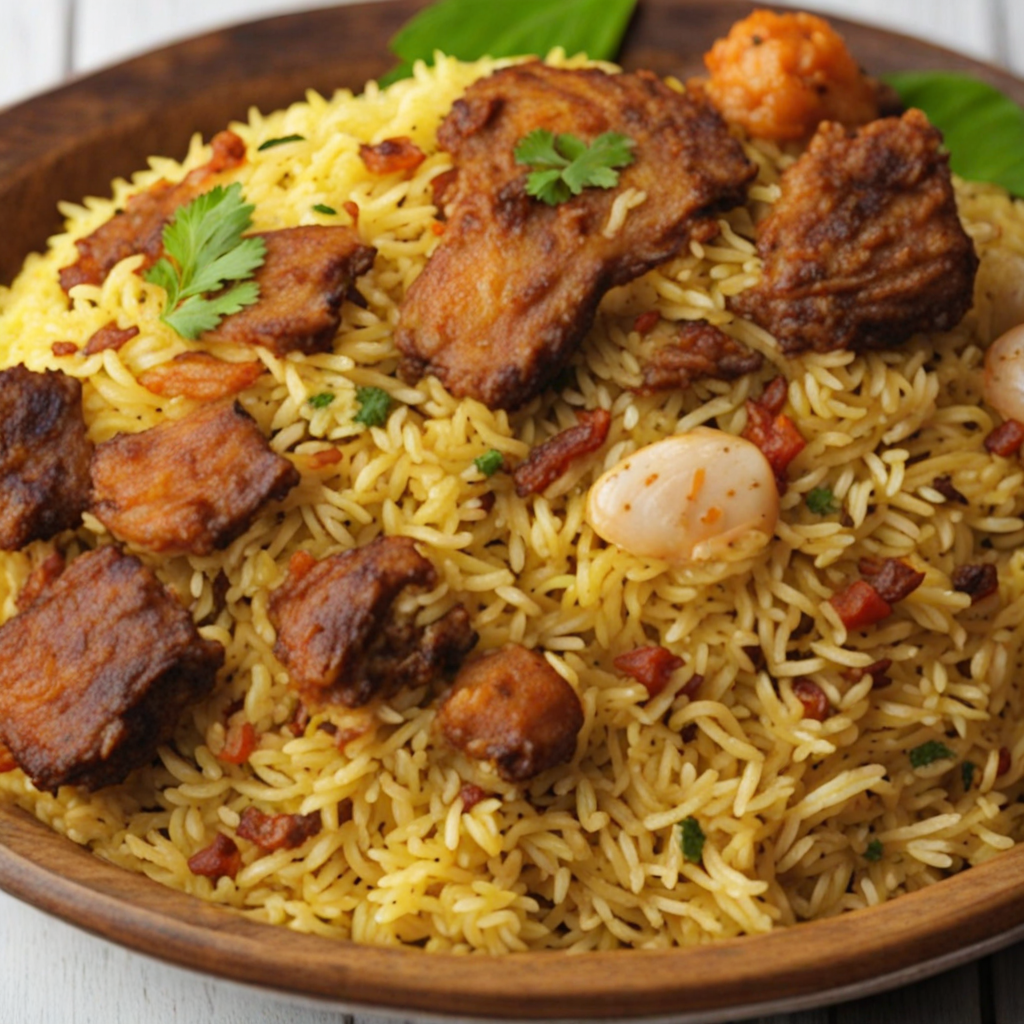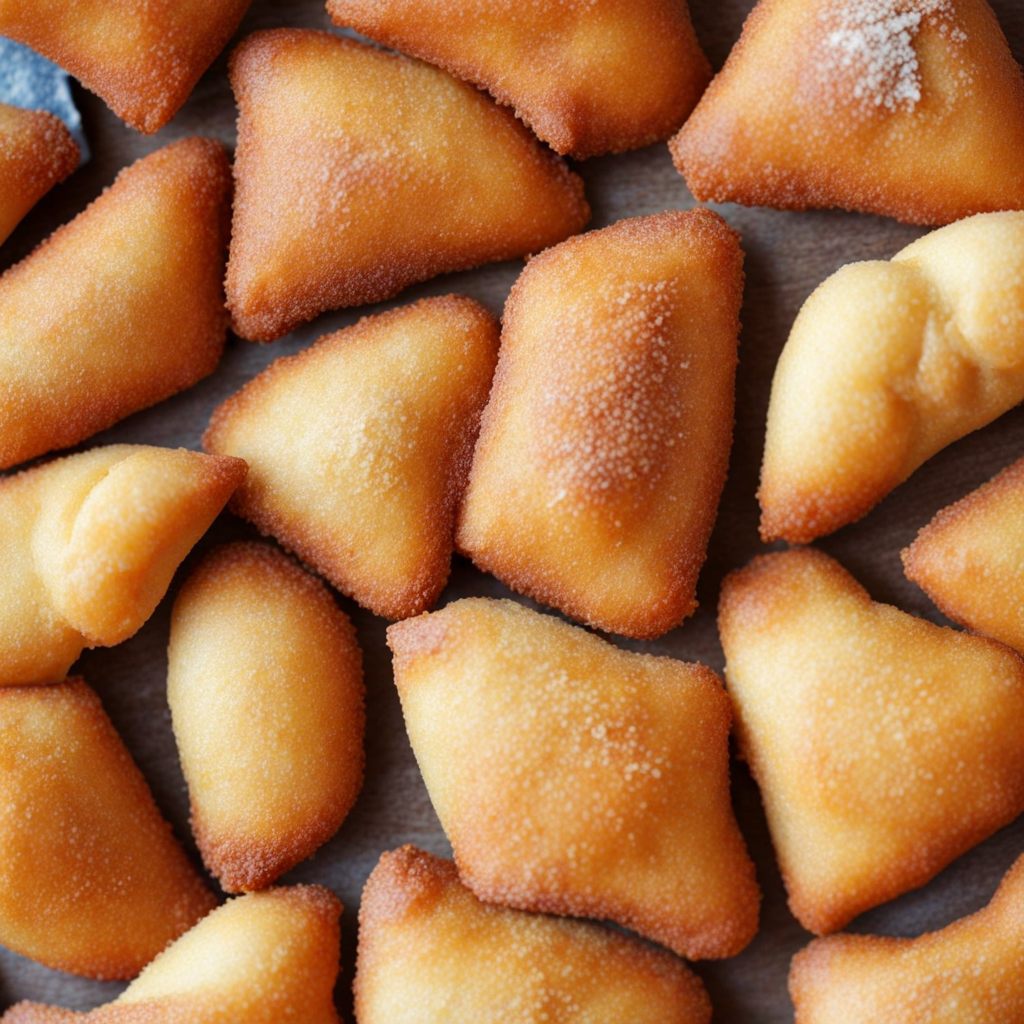Mkate Wa Ufuta
Mkate Wa Ufuta is a traditional Tanzanian sesame seed bread that offers a delightful combination of nutty flavors and a satisfyingly chewy texture. Made from simple, wholesome ingredients, this bread is primarily crafted from flour, water, and a generous amount of crushed sesame seeds, which not only impart a rich, earthy taste but also provide a delightful crunch. The sesame seeds are often toasted before being mixed into the dough, enhancing their flavor and adding a depth that makes each bite a truly unique experience. This bread is usually slightly sweet, making it a versatile accompaniment for both savory and sweet dishes. The preparation of Mkate Wa Ufuta is a labor of love, often involving hand-kneading and resting the dough to achieve the perfect rise. Traditionally, it is baked in a clay oven or on a hot stone, which gives it a distinctive smoky flavor and a crust that is both crispy and golden brown. The interior remains soft and airy, making it an ideal base for various toppings or fillings. Whether served alongside a hearty stew, slathered with honey, or enjoyed on its own, this bread is a celebration of Tanzanian culinary heritage. The enjoyment of Mkate Wa Ufuta goes beyond its taste; it is often shared among family and friends during communal meals, enhancing the sense of togetherness that is central to Tanzanian culture. As you bite into this delicious bread, you will not only savor its unique flavor but also appreciate the rich traditions that surround its making. This delightful bread is a wonderful introduction to the diverse and vibrant world of Tanzanian cuisine, inviting food lovers to explore more of the country's culinary treasures.
How It Became This Dish
Mkate Wa Ufuta: A Culinary Journey Through Tanzania's Rich Heritage Nestled within the vibrant tapestry of Tanzanian cuisine, Mkate Wa Ufuta, or sesame seed bread, stands as a delightful testament to the country's rich culinary traditions and the influences that have shaped its food culture over centuries. This simple yet flavorful bread not only nourishes the body but also connects generations and communities through shared culinary practices. Origins and Historical Context The origins of Mkate Wa Ufuta are deeply intertwined with the history of the East African coast, a region that has long been a melting pot of cultures, peoples, and trade. The Swahili Coast, which stretches from modern-day Somalia down to Mozambique, has been a significant hub for trade for over a millennium. Merchants from the Middle East, India, and even further afield brought with them spices, grains, and cooking techniques that would influence local food traditions. Sesame seeds, known scientifically as *Sesamum indicum*, are believed to have originated in Africa and were cultivated as early as 3000 BC. The seeds were prized for their oil and nutritional value, making them a staple in various cuisines. In Tanzania, particularly along the coastal regions, sesame seeds became integral to local dishes, including Mkate Wa Ufuta. The bread itself is a blend of simple ingredients: flour, water, salt, and ground sesame seeds, which are often toasted to enhance their nutty flavor. Cultural Significance Mkate Wa Ufuta is more than just a food item; it is a cultural symbol reflecting the communal and familial bonds present in Tanzanian society. Traditionally, it is served during significant events such as weddings, religious celebrations, and communal feasts. The act of preparing and sharing Mkate Wa Ufuta fosters a sense of togetherness and unity, as families and friends gather to create and enjoy this beloved dish. In many Tanzanian households, the preparation of Mkate Wa Ufuta is a cherished ritual passed down through generations. Grandmothers often teach their grandchildren the art of making this bread, sharing stories and traditions along with the recipe. This oral tradition not only preserves the culinary technique but also strengthens familial ties and cultural identity. Additionally, Mkate Wa Ufuta is often enjoyed as a breakfast staple, served alongside tea or coffee. Its versatility allows it to be paired with various accompaniments, from honey and jam to savory stews, making it a beloved choice across different meals. The bread's nutritional profile, enriched by the sesame seeds, makes it a wholesome option, providing energy and sustenance to families. Development Over Time As Tanzania has evolved, so too has the preparation and consumption of Mkate Wa Ufuta. The bread's simplicity has allowed it to adapt to changing tastes and lifestyles, while still maintaining its core identity. The advent of modern techniques and ingredients has introduced new variations of the traditional recipe, appealing to a broader audience. In urban areas, Mkate Wa Ufuta can now be found in bakeries and cafes, often served alongside international dishes, reflecting the globalization of Tanzanian cuisine. The traditional methods of preparation are still honored, but innovations such as using whole wheat flour or incorporating other seeds have emerged to cater to health-conscious consumers. Moreover, the rise of the farm-to-table movement and increased awareness of healthy eating has revitalized interest in traditional foods like Mkate Wa Ufuta. Many people are now returning to their roots, seeking out authentic recipes and local ingredients, which has led to a resurgence of traditional baking methods. This revival not only underscores the importance of Mkate Wa Ufuta in Tanzanian culture but also promotes sustainable agricultural practices. Mkate Wa Ufuta in the Global Context As Tanzanian cuisine gains recognition on the international stage, Mkate Wa Ufuta has also begun to attract attention outside of its homeland. Food enthusiasts and chefs are increasingly exploring African cuisines, seeking to incorporate traditional ingredients and recipes into contemporary culinary practices. This newfound appreciation for Mkate Wa Ufuta has led to its inclusion in fusion cuisine, where it is creatively combined with flavors and techniques from around the world. In diaspora communities, Mkate Wa Ufuta serves as a culinary bridge between generations and cultures. It allows Tanzanian expatriates to reconnect with their roots, providing a sense of nostalgia and belonging. Community events and potlucks often feature this bread, fostering a shared experience that honors their heritage while adapting to new environments. Conclusion: A Culinary Legacy Mkate Wa Ufuta is more than just a bread; it is a rich symbol of Tanzania's history, culture, and resilience. From its ancient origins along the East African coast to its place in modern kitchens, it encapsulates the spirit of a nation that values tradition while embracing innovation. As families continue to gather around the table to share this simple yet profound dish, Mkate Wa Ufuta remains a cherished link to the past and a beacon for the future. In a world that often prioritizes fast food and convenience, the slow, intentional process of making Mkate Wa Ufuta serves as a reminder of the beauty of patience and the power of food to connect us. As its popularity spreads, this humble bread carries with it the stories of the people who have lovingly crafted it for generations, ensuring that its legacy will endure for many more to come.
You may like
Discover local flavors from Tanzania


